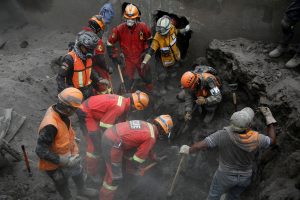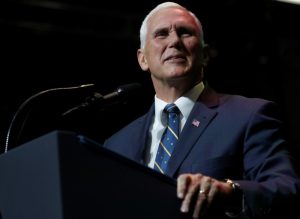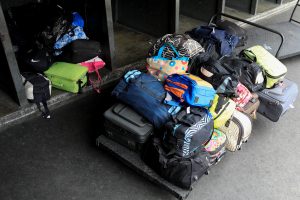
By Vivian Sequera and Angus Berwick
CARACAS (Reuters) – Three hours before Venezuela’s El Nacional newspaper goes to print, a bare-bones staff of 20 journalists toils in its vast newsroom, surrounded by empty desks.
A poster on a wall warns employees not to steal toilet paper while another asks for medicine for a reporter’s mother, as the scarcity of basic goods that has forced over a million people to leave Venezuela also takes its toll on the country’s last independent national newspaper.
Printing the paper has become a daily struggle, its editors say. Currency controls imposed by the Venezuelan government are strangling imports, meaning newsprint, ink and printing equipment are scarce.
Now, however, El Nacional finds itself at a potentially perilous juncture after President Nicolas Maduro’s top lieutenant successfully sued for defamation in a Venezuelan court.
Diosdado Cabello, head of Venezuela’s powerful Constituent Assembly, sued El Nacional in 2015 after it re-published an article from Spanish newspaper ABC reporting he was under investigation by U.S. authorities for drug trafficking.
Cabello has denied any involvement in the drug trade. He says there is no proof against him and the accusations are aimed at tarnishing his reputation.
While pro-government newspapers like Ultimas Noticias operate freely in Venezuela, El Nacional often finds itself in the crosshairs of Maduro’s ruling Socialist party.
El Nacional’s independent reporting and headlines documenting power cuts, allegations of electoral fraud and strikes by desperate workers have prompted senior government leaders to regularly single out El Nacional’s coverage for public criticism.
Maduro’s supporters have assailed the paper as biased and accuse it of trying to precipitate his ouster. El Nacional denies this and says it accurately covers the current crisis.
The paper says the report it published in January 2015 was correct. In May, the U.S. Treasury sanctioned Cabello, freezing his assets and imposing a travel ban, and said in a statement he had organized drug shipments from Venezuela to Europe and shared the profits with Maduro, who is also under U.S. sanctions.
A suit brought by Cabello against the Wall Street Journal in 2015 for reporting his alleged links to drug trafficking was dismissed by U.S. courts. A spokeswoman for Dow Jones, which publishes the Journal, said the newspaper did not face any legal action in Venezuela related to that reporting.
In June, a tribunal in Caracas ordered El Nacional to pay Cabello the 1 billion bolivars he demanded in 2015 for libel for publishing the ABC story. Due to hyperinflation, that is worth just $300 today but the court said it should be adjusted for price rises.
As the central bank has not published inflation data for three years, it is unclear how high the final award might be but according to Cabello it could potentially amount to hundreds of millions of dollars.
“I swear to you I will make you pay,” Cabello said on his weekly state TV show in June, referring by name to El Nacional’s owner Miguel Henrique Otero, who recently emigrated to Spain.
Cabello showed a mocked-up front page of El Nacional entitled “The Wall Street Furrial”, named after his hometown of El Furrial, fuelling speculation by pro-government legislators that he would seize the newspaper if it could not pay the fine.
Asked by Reuters about his plans, Cabello said his lawyer had asked the court to update the fine using the expected 2018 inflation rate the newspaper published in June of 300,000 percent – based on a calculation by Venezuela’s opposition-controlled National Assembly.
“As El Nacional never lies, the figure should be what they put on their front page,” Cabello said, adding that inflation for the previous two years should also be taken into account.
The court said in its ruling it would assign an independent expert to calculate how to update the fine but did not say who that would be.
“DISRUPT” THE PAPER
El Nacional’s lawyer Juan Garanton said the newspaper had appealed the ruling. The court’s decision makes no mention of what would happen if it is unable to pay but Garanton said Cabello would have no right to seize the paper.
Under Venezuelan commercial law, if a company does not pay a court-imposed fine, the tribunal can seize its assets for auction.
“I don’t think he wants the paper…What he wants is to disrupt it,” Garanton said.
Otero, whose grandfather founded the paper 75 years ago, declined to comment on the fine or the possibility of a takeover.
In a phone interview from Madrid, he said advertising on El Nacional’s foreign-hosted website was earning it valuable hard currency to keep the publication going.
“We’re going to try to maintain the print edition until the end, even if it’s just a page because it’s politically symbolic,” he said.
In addition to the prospect of a punishing fine, El Nacional faces other challenges. Staffing at the newspaper is one-fifth of the 2,000 employees it had over a decade ago. More staff join the exodus of Venezuelans emigrating each week, editor-in-chief Patricia Spadaro said.
“They can’t endure the crisis,” Spadaro said, surrounded by dozens of empty cubicles. The United Nations estimates that 1 million Venezuelans left the country between 2015 and 2017, from a population of around 32 million.
Due to lack of paper, El Nacional says its circulation has dwindled to 20,000 copies, just one-tenth of what it was a decade ago.
Spadaro said a nationalized company that controls paper distribution, the Alfredo Maneiro Editorial Corporation, did not sell to El Nacional. Instead, the newspaper buys from a joint-venture of major Latin American newspapers, importing supplies by ship.
“There has been a policy to suffocate the independent media in Venezuela,” Spadaro said.
Neither the Information Ministry nor the Maneiro Corporation, controlled by the ministry, responded to multiple requests for comment.
(Editing by Daniel Flynn and Alistair Bell)












